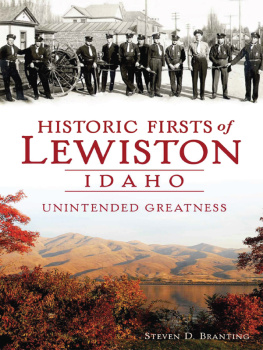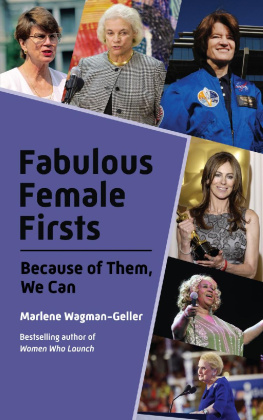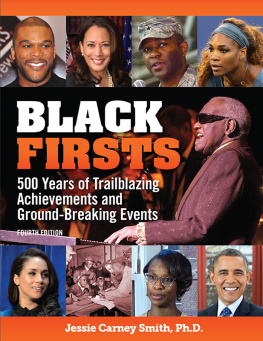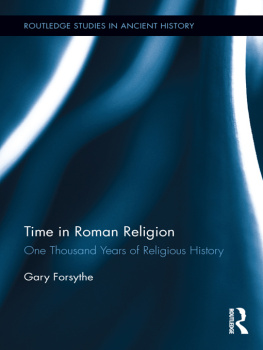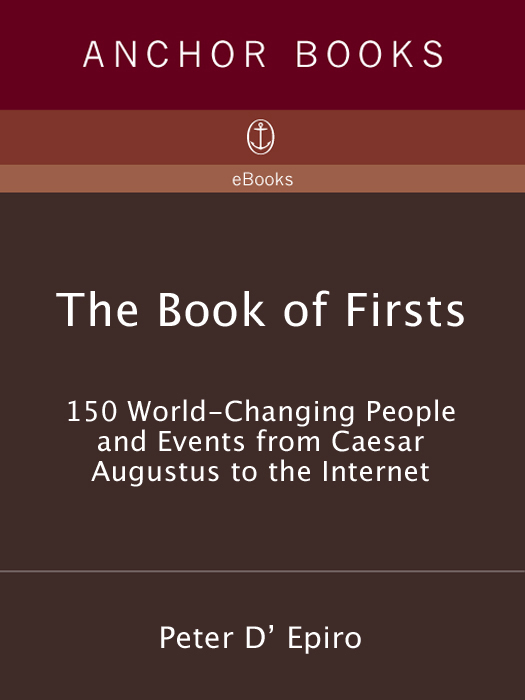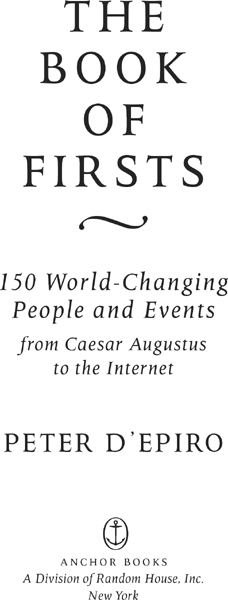
PETER DEPIRO

THE BOOK OF FIRSTS
Peter DEpiro received a BA and MA from Queens College and an MPhil and PhD in English from Yale University. He has taught English at the secondary and college levels and worked as an editor and writer for thirty years. He has written (with Mary Desmond Pinkowish) Sprezzatura: 50 Ways Italian Genius Shaped the World (Anchor Books, 2001) and What Are the Seven Wonders of the World? and 100 Other Great Cultural ListsFully Explicated (Anchor Books, 1998), which has appeared in British, German, Russian, Lithuanian, and Korean editions. He has also published a book and several articles on Ezra Pounds Cantos, a book of translations of African-American poetry into Italian, and rhymed verse translations from Dantes Inferno. He has a grown son, Dante, and lives with his wife, Nancy Walsh, in Ridgewood, New Jersey.
ALSO BY PETER DEPIRO
Sprezzatura: 50 Ways Italian Genius Shaped the World
(with Mary Desmond Pinkowish)
What Are the Seven Wonders of the World?
and 100 Other Great Cultural ListsFully Explicated
(with Mary Desmond Pinkowish)
For Nancy

Si nous vei, Domna don plus mi cal,
Negus vezer mon bel pensar no val.
(And if I do not see you, Lady mine,
No sight is worth your image in my mind.)
Bernart de Ventadorn (fl. 115080)
Contents
Preface
W E ALL REMEMBER hundreds of key events in our lives that can be evoked by the casual question, What was the first time you ever ? Depending on the rest of that question, we may find ourselves searching our memory banks for an incident decent or indecent, momentous or trivial, too pathetically droll to relate without laughter or too depressingly sad for words.
The first of anything in our lives acquires an aura all its own: the first time I spoke French in France, the first time I had an erotic dream, the first time I flew, the first time I got into a fight, the first award I ever won, the first time someone let me down.
If mundane firsts like these assume such importance in our eyes, the groundbreaking firsts of the mighty of the earthits great heroes, artists, thinkers, discoverers, and villainsacquire something of the same magical glow as those of our private lives, except writ large. In their case, the firsts were not cosmically (or even locally) insignificant but represented audacious deeds never before seen on earth. If some of our private firsts determined the future course of our own lives, the historical firsts often determined, for better or worse, the fate of a large segment of the human race.
As in our own lives, the very firstsuch as the first discovery of gunpowder in Chinamight ultimately have less significance than another similar first at a different time and placesuch as the first use of gunpowder in cannons in Europe, which allowed the rise of powerful and centralized European nations by denying local nobles the protection of formerly impregnable castles. Countries such as France, England, Spain, and Portugal were thus empowered to conquer, exploit, and some would say civilize, some would say terrorize, much of the rest of the world. Similarly, the printing press (first used in China) began to have its earth-shattering impact only after it was first used in Europe at a time when it fueled religious divisions, world exploration, the growth of a literate middle class, and the rediscovery of the ancient world. Likewise, the first voyages of Europeans to the Americas (Norsemen, c. 1000) produced nothing of lasting consequence, whereas Columbuss four voyages mightily diverted the course of subsequent history.
In attempting to understand human history as an organic development, we nonetheless impute a special importance to the first occurrence of a certain type of event, whether it be an invention, a philosophy, a literary genre, a geographic discovery, or a scientific breakthrough, because this helps us go back and determine which future aspects were already present ab ovo, which were gradual accretions, and which had intriguingly little to do with what came after. Who (or what) was the first? always implicitly carries within it the question, Who (or what) was the first to make a real difference?
Who was the first to sack the city of Rome? Write a sonnet? Take a picture? What was the first university? The first great novel of world literature? The first astronomical telescope? The first flying machine? These are the kinds of questions youll find answered and explained in this book, which focuses on 150 of the most significant firsts that occurred in the first twenty centuries of the Christian (or Common) era.
The essays for each century are prefaced by a listing of all the who or what questions for that section, consecutively numbered throughout the book for a total of 150 questions, answers, and essays. The essays attempt to explain the answers engagingly and informatively, putting them in historical context and often aiming at clarification of the difference between the absolute first and the first that really mattered.
Theres a certain pathos or poignancy to some of the firsts youll read about, such as the first four-wheeled automobile consisting of a primitive engine plopped onto a stagecoach, or the paltry twelve-horsepower engine of the first airplane (see Questions 141 and 144). If only theyd known what we know! we like to say, but of course without thousands of pioneers like the ones in this book, we wouldnt know much of anything.
In An Essay on Criticism, Alexander Pope counseled wariness toward innovation:
Be not the first by whom the new are tried,
Nor yet the last to lay the old aside.
Conservative Mr. Pope was urging the writers of his time (1711) to exercise caution before adopting trendy new words too quickly, but most of us admire those brave souls who boldly go where no man [or woman] has gone and start something new for the rest of humankind to follow. Sometimes, however, the wisest course to pursue in the face of something new is to shun it, and examples of these firsts are liberally sprinkled throughout this book, as even a cursory glance at the table of contents will demonstrate. Those notorious firsts serve to remind us that much of what history considers worthy of recording is a succession of unspeakably cruel actions in the eternal saga of how homo homini lupus estman is a wolf to man.
Sometimes the process of sifting out a first is well-nigh impossible. Sigmund Freud observed that every discovery is made more than once, and none is made all at once, nor is success meted out according to deserts. America is not named after Columbus. This sentiment was echoed and amplified by William F. Ogburn and Dorothy Thomas of Columbia University who, in 1922, compiled a list of 148 major scientific, mathematical, and technological discoveries that were made independently or more or less simultaneously by two or more persons. For examples in this book, see Questions 126 and 137.



